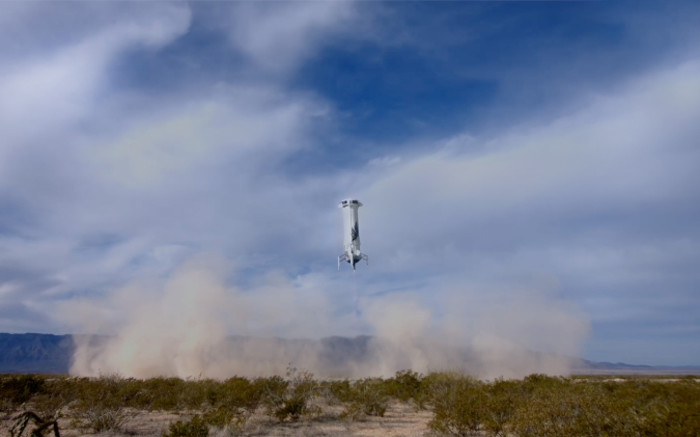
Although the NS-24 mission carried a payload of scientific experiments rather than humans, it paves the way for Jeff Bezos’ aerospace company to bring wealthy adventure seekers back to the final frontier.
Blue Origin’s New Shepard suborbital rocket lands after a successful flight on December 19, 2023. Image: @blueorigin/X
WASHINGTON – Blue Origin launched its first rocket in more than a year on Tuesday, reviving the U.S. company’s fortunes with a successful return to space after an unmanned crash in 2022.
Although the NS-24 mission carried a payload of scientific experiments rather than humans, it paves the way for Jeff Bezos’ aerospace company to bring wealthy adventure seekers back to the final frontier.
The New Shepard suborbital rocket lifted off from the launch pad at Launch Pad One near Van Horn, Texas, at 10:42 a.m. (16:42 GMT).
Take off 🚀#NS24 pic.twitter.com/85wTik0CET
‘Blue Origin (@blueorigin) December 19, 2023
After separating from the booster, the rubber drop-shaped capsule reached a peak altitude of 66.5 miles (107 kilometers) above sea level, well above the internationally recognized limit of space, the Karman Line, which is 62 miles high.
The launch vehicle then successfully landed vertically on the launch pad against the majestic backdrop of the Sierra Diablo mountains, and a few minutes later the capsule was floating on the desert floor on three huge parachutes.
In total, the mission lasted 10 minutes and 13 seconds.
Booster touchdown. #NS24 pic.twitter.com/Z4keYXzlby
‘Blue Origin (@blueorigin) December 19, 2023
Back to 🌎. #NS24 pic.twitter.com/kebApFAl8K
‘Blue Origin (@blueorigin) December 19, 2023
“Demand for New Shepard flights continues to grow and we look forward to increasing our flight frequency in 2024,” said Phil Joyce, senior vice president of the company.
Science experiments on board included one that demonstrated the operation of hydrogen fuel cell technology in zero gravity and another that showed how water and gas move in a weightless environment.
Future applications could include monitoring water quality for astronauts in space.
LONG BREAK
On September 12, 2022, a Blue Origin rocket burst into flames shortly after launch. The capsule attached to the nose of the rocket successfully initiated an emergency separation sequence and floated safely to the ground.
The accident triggered a year-long investigation by the Federal Aviation Administration (FAA), which found that the accident was due to the failure of an engine nozzle that was experiencing higher than expected operating temperatures.
The regulator issued a series of corrective measures that Blue Origin had to take before the company could resume flight operations, including the redesign of certain engine parts.
In total, Blue Origin has operated six crewed flights since July 2021, when Bezos himself took part in the first one – some passengers were paying customers, others were guests.
While Blue Origin remained grounded, competitor Virgin Galactic – the company founded by British billionaire Richard Branson – continued with five commercial flights this year.
Just hours after Blue Origin’s success, Virgin announced that the flight window for its next mission would open on January 26th.
“We are excited to begin 2024 by launching four new Virgin Galactic astronauts into space with our Galactic 06 mission,” CEO Michael Colglazier said in a statement.
The two companies compete in the emerging space tourism sector and operate in suborbital space.
REUSABLE ROCKET, NO CO2 EMISSIONS
While Blue Origin vertically launches a small rocket, Virgin Galactic uses a large carrier aircraft to gain altitude and then launch a smaller, rocket-powered spaceplane to complete the journey into space.
In both cases, passengers enjoy a few minutes of weightlessness and can observe the curvature of the earth through large windows.
Virgin Galactic tickets sold for $200,000 to $450,000; Blue Origin does not publicly disclose its ticket prices.
Blue Origin boasts that almost the entire rocket platform is reused, including the booster, capsule, engine, landing gear and parachutes.
Its engine now runs on liquid oxygen and hydrogen, meaning the only byproduct of flight is water vapor, with no carbon emissions.
Blue Origin is also developing a heavy commercial rocket called New Glenn, with its first flight scheduled for next year.
This 98-meter (320-foot) rocket is designed to carry payloads of up to 45 tons into low-Earth orbit.






Recent Comments